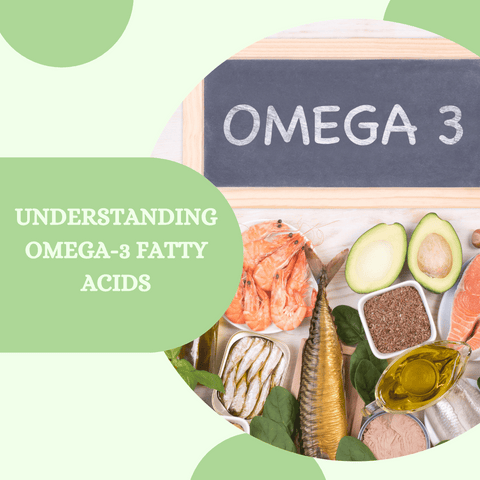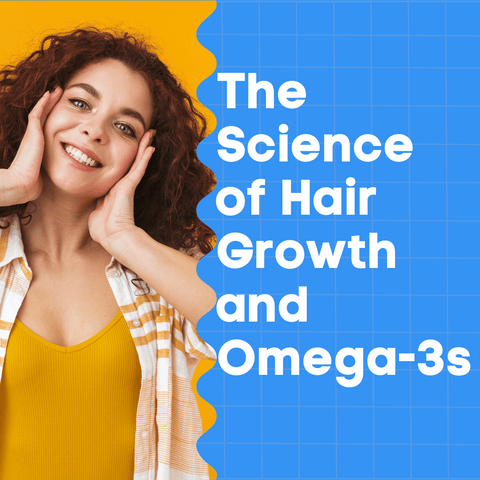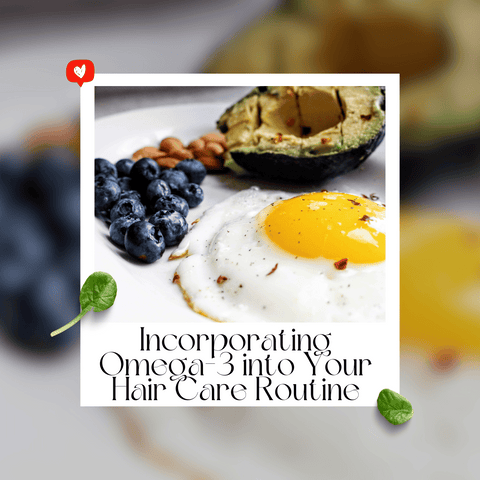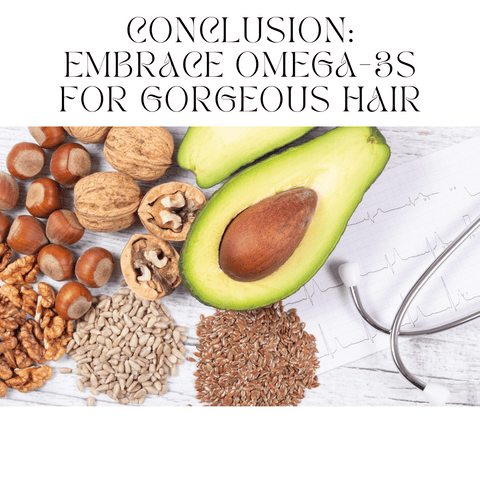Omega-3 fatty acids are a type of essential fat that plays an important function in general health and may have a good effect on hair health. While the relationship between omega-3s and hair development isn't entirely understood, there are various ways these fatty acids can potentially help your locks, including scalp health, hydration, strength and elasticity, hair loss reduction, and anti-inflammatory characteristics. It is crucial to remember that the effect of omega-3 fatty acids on hair health varies from person to person. While these fatty acids can be included in a balanced diet and may enhance hair health, they should only be seen as one component of complete hair care. Other factors influencing hair health include genetics, overall nutrition, and hair care practises. If you have specific hair concerns, it is best to consult a dermatologist or other healthcare professional.
Understanding Omega-3 Fatty Acids

Omega-3 fatty acids are a type of vital polyunsaturated fat that plays an important function in general health. They are called "essential" because the human body cannot create them on its own and must get them through diet or supplementation. Omega-3 fatty acids are well-known for their many health advantages. The three most important omega-3 fatty acids are Alpha-Linolenic Acid (ALA), Eicosapentaenoic Acid (EPA), and Docosahexaenoic Acid (DHA). Consider consuming fatty fish, flaxseeds, chia seeds, walnuts, and hemp seeds to increase your intake of omega-3 fatty acids. If you don't receive enough of these foods, omega-3 supplements are available, such as fish oil capsules or algae oil capsules for vegetarians and vegans. Before beginning any new supplement regimen, it is critical to contact a healthcare practitioner, especially if you have specific health concerns or illnesses.
What Are Omega-3 Fatty Acids?
Omega-3 fatty acids are a type of polyunsaturated fat that is necessary for optimal health. They are classified as essential fats since the human body cannot generate them and must receive them through diet. There are different forms of omega-3 fatty acids, each with its own set of health benefits. Consider consuming fatty fish, flaxseeds, chia seeds, walnuts, and hemp seeds to increase your intake of omega-3 fatty acids. If you don't receive enough of these foods, omega-3 supplements are available, such as fish oil capsules or algae oil capsules for vegetarians and vegans. Before beginning any new supplement regimen, it is critical to contact a healthcare practitioner, especially if you have specific health concerns or illnesses.
Sources of Omega-3s for Hair Health
Omega-3 fatty acids can help promote hair health by maintaining a healthy scalp, lowering inflammation, and potentially enhancing hair quality and strength. Include omega-3-rich items in your diet to help with this. Here are some omega-3 sources for hair health:
-
Fatty Fish: Fatty fish are high in omega-3 fatty acids, particularly EPA and DHA, which have been linked to hair health. Consider eating salmon, mackerel, sardines, herring, and trout.
-
Flaxseeds: Flaxseeds are high in ALA, a plant-based omega-3 fatty acid. Ground flaxseeds can be sprinkled on yoghurt, cereal, or blended into smoothies for a daily omega-3 boost.
-
Chia Seeds: Chia seeds are another source of ALA found in plants. They, like flaxseeds, can be added to yoghurt, oatmeal, or beverages to boost omega-3 intake.
-
Walnuts: Walnuts are an easy and tasty way to get ALA. Snacking on a handful of walnuts or incorporating them into your meals is a simple way to increase your omega-3 intake.
-
Hemp Seeds: Hemp seeds contain ALA and can be sprinkled on salads, yoghurt, or blended into smoothies.
-
Fish Oil Supplements: If you do not like fish or prefer a more concentrated source of omega-3s, fish oil supplements are available. Before beginning any new supplement regimen, consult with a healthcare professional.
While omega-3 fatty acids can help with hair health, it's vital to remember that they are only one aspect of complete hair care. Other factors influencing hair health include genetics, overall nutrition, and hair care practises. If you have specific hair difficulties, you should seek personalised advice and recommendations from a dermatologist or healthcare professional.
Omega-3 Supplements: A Hair-Boosting Option
Omega-3 pills are a quick and easy way to increase your omega-3 intake for potential hair health advantages. Omega-3 fatty acids, particularly EPA and DHA, are well-known for their anti-inflammatory qualities and overall health benefits, which can include improved hair health. If you're considering using omega-3 supplements to encourage healthy hair, consider the following:
-
Consult a Healthcare Professional: It is best to consult with a healthcare professional before beginning any supplement regimen, including omega-3 supplements. They can advise you on whether supplementation is necessary for your specific needs and overall health.
-
Choose High-Quality Supplements: If you and your doctor agree that omega-3 supplementation is a good idea, choose high-quality supplements. Look for products that have been third-party tested for purity and potency to ensure you are getting a dependable product.
-
Choose the Correct Omega-3: Omega-3 supplements come in a variety of forms, such as fish oil, krill oil, and algae oil. Fish oil is a popular option, but if you are vegetarian or vegan, algae oil is a plant-based option that contains DHA and EPA.
-
Dosage: The recommended dose of omega-3 supplements varies depending on individual factors such as age, gender, and specific health goals. Your doctor can advise you on the appropriate dosage.
-
Consistency: To potentially reap the hair health benefits of omega-3s, it is critical to take the supplements on a regular basis as directed.
-
Other Considerations: Omega-3 supplements provide a variety of health benefits in addition to hair health, such as heart health, cognitive function, and anti-inflammatory properties. Consider how omega-3 supplements might fit into your overall health and wellness strategy.
-
Monitor for Side Effects: When taking omega-3 supplements, some people may experience side effects such as fishy burps or gastrointestinal discomfort. If you experience any side effects, talk to your doctor about them.
It is important to remember that, while omega-3 supplements might support hair health, they are only one aspect of comprehensive hair care. Factors such as genetics, overall nutrition, and hair care practises all play a role in maintaining healthy hair. If you have specific hair concerns, are experiencing hair loss, or are experiencing other hair-related issues, it is best to consult with a dermatologist or healthcare professional for a thorough evaluation and personalised recommendations.
The Science of Hair Growth and Omega-3s

The science of hair development, as well as the possible impact of omega-3 fatty acids, notably EPA and DHA, is a topic of continuous study and interest. Omega-3 fatty acids may improve hair health through a number of mechanisms, including improved scalp health, diminished inflammation, increased blood flow, hydration, strength, and elasticity, and decreased hair loss, even though the connection between omega-3 fatty acids and hair growth is not fully understood. It is important to note that, while omega-3s can help with hair health, they are only one component of total hair care. Hair care practises, genetics, and overall nutrition all play important roles in maintaining healthy hair. If you want to promote hair growth through diet, consider including omega-3-rich foods or supplements in your diet. However, before beginning any new supplement regimen, consult with a healthcare professional, especially if you have specific health concerns or conditions.
The Role of Omega-3 in Hair Growth
Omega-3 fatty acids enhance hair formation through a variety of mechanisms, though the precise relationship is unknown. A variety of factors, including scalp health, reduced inflammation, blood circulation, hydration, strength and elasticity, and reduced hair loss, are thought to influence the potential benefits of omega-3 fatty acids in stimulating hair production. While omega-3 fatty acids may be beneficial to hair health, keep in mind that they are only one component of total hair care. Hair care practises, genetics, and overall nutrition all play important roles in maintaining healthy hair.
Consider including omega-3-rich foods in your diet, such as fatty fish, flaxseeds, chia seeds, walnuts, and hemp seeds, to potentially stimulate hair development. If you don't get enough omega-3s from your diet, omega-3 supplements like fish oil or algal oil capsules are available. It is critical to contact a healthcare practitioner before beginning any new supplement regimen, especially if you have specific health concerns or problems. Furthermore, if you have specific concerns about hair loss or other hair-related disorders, consult a dermatologist or healthcare professional for a comprehensive evaluation and personalised recommendations. They can assist in determining the underlying reasons for any hair issues and provide personalised hair health remedies.
Omega-3s and Hair Follicle Health
Omega-3 fatty acids are a type of essential fat that plays an important function in general health and may have an indirect effect on hair follicle health. Omega-3 fatty acids are found mostly in fatty fish, flaxseeds, chia seeds, walnuts, and a few other foods. Omega-3 fatty acids are classified into three types: alpha-linolenic acid (ALA), eicosapentaenoic acid (EPA), and docosahexaenoic acid (DHA). Here's how omega-3 fatty acids may improve hair follicle health:
-
Anti-Inflammatory Properties: Omega-3 fatty acids are anti-inflammatory. Chronic inflammation can cause seborrheic dermatitis, which affects the scalp and hair follicles. Reducing inflammation may improve the overall health of the scalp and hair follicles.
-
Circulation and Nutrient Delivery: Omega-3 fatty acids have been shown to improve blood circulation, which is necessary for delivering nutrients and oxygen to hair follicles. Better circulation can help keep hair follicles healthy and promote hair growth.
-
Hydration and Oil Production: Omega-3 fatty acids can aid in the maintenance of the skin's lipid barrier and hydration. A healthy scalp is essential for healthy hair follicles. Dry, flaky, or irritated skin can harm hair follicles.
-
DHT Inhibition: Some research points to omega-3 fatty acids as a possible aid in lowering DHT levels, a hormone that may be linked to hair loss, particularly in cases of androgenetic alopecia (male-pattern baldness).
-
Omega-3 Deficiency: If you are deficient in omega-3 fatty acids, you may experience dry, brittle hair and even hair loss. This deficiency can be addressed by supplementing your diet with omega-3-rich foods or supplements.
While omega-3 fatty acids can help with general hair health, they are only one element among several. Genetics, your overall diet, your lifestyle, and other factors all have an impact on the health of your hair and hair follicles. If you're worried about hair loss or hair health, see a doctor or dermatologist. They may assist you in determining the root causes of any hair problems and recommending a suitable treatment strategy, which may involve dietary modifications or supplements as well as other interventions. Furthermore, it is critical to not rely just on omega-3s for hair health but to maintain a healthy diet and overall lifestyle.
How Omega-3s Promote Hair Thickness
Hair follicle health is critical for overall hair health and growth. Omega-3 fatty acids, particularly EPA (eicosapentaenoic acid) and DHA (docosahexaenoic acid), may help maintain hair follicle health due to their anti-inflammatory properties and potential effects on the scalp and hair follicles. The following is how omega-3 fatty acids may support the health of hair follicles:
-
Reducing Scalp Inflammation: Chronic scalp inflammation can have an impact on hair follicle health and function. Anti-inflammatory properties of omega-3 fatty acids can help reduce scalp inflammation, allowing hair follicles to thrive.
-
Balancing the Hair Growth Cycle: The hair growth cycle has several phases, including anagen (growth) and telogen (resting and shedding). Imbalances in this cycle can result in hair loss. Omega-3 fatty acids may aid in the maintenance of a more balanced hair growth cycle, potentially reducing hair loss and promoting more robust hair growth.
-
Supporting Blood Circulation: Omega-3 fatty acids can improve overall cardiovascular health, which benefits hair follicles indirectly. Hair follicles receive a steady supply of essential nutrients and oxygen from healthy blood circulation, promoting their health and function.
-
Hydration and Strength: Omega-3 fatty acids can aid in the maintenance of the scalp's and hair's natural oil production. Hair that is well-hydrated is less prone to damage and breakage. Furthermore, omega-3s can improve hair strength and elasticity, which can benefit hair follicle health.
-
Reducing Oxidative Stress: Omega-3 fatty acids have antioxidant properties that can aid in the reduction of oxidative stress, which can damage hair follicles and lead to hair loss.
While omega-3 fatty acids can help with hair follicle health and general hair health, it's crucial to realise that they're only one piece of the picture. Other elements that contribute to healthy hair and hair follicles include genetics, an overall diet, and hair care practises. Consider introducing omega-3-rich foods or supplements into your diet if you want to promote hair health through nutrition. There are omega-3 supplements available for vegetarians and vegans, such as fish oil capsules or algal oil capsules. However, before beginning any new supplement regimen, it is critical to contact a healthcare practitioner, especially if you have specific health concerns or illnesses.
Incorporating Omega-3 into Your Hair Care Routine

Incorporating omega-3 fatty acids into your hair care regimen can help maintain hair health from the inside. While hair care products can assist with exterior maintenance, a diet high in omega-3 fatty acids can improve the overall health of your hair from the roots up. Here's how to incorporate omega-3s into your hair care routine:
-
Dietary Sources: Include foods high in omega-3s in your daily diet. Fatty fish such as salmon, mackerel, sardines, and trout are high in EPA and DHA. Additionally, incorporate plant-based sources of ALA, such as flaxseeds, chia seeds, walnuts, and hemp seeds.
-
Omega-3 Supplements: If you are having trouble meeting your omega-3 requirements through diet alone, consider taking omega-3 supplements. There are fish oil capsules and algae oil capsules (for vegetarians and vegans). Before beginning any new supplement regimen, consult with a healthcare professional.
-
Balanced Diet: Make sure your overall diet is balanced and contains the nutrients your hair needs. This includes eating a variety of fruits and vegetables, lean proteins, and whole grains, as well as omega-3-rich foods.
-
Stay Hydrated: Proper hydration is critical for hair health. Drink enough water to keep your scalp and hair hydrated.
-
Gentle Hair Care Practises: Avoid damaging your hair by using excessive heat styling, harsh chemical treatments, and tight hairstyles. To keep your scalp and hair healthy, use a gentle, sulfate-free shampoo and conditioner.
-
Scalp Massage: Regular scalp massages can increase blood circulation to the hair follicles, promoting a healthy environment for hair growth.
-
UV protection: Prolonged sun exposure can cause hair damage. In bright sunlight, use sunscreen, wear a hat, or cover your hair.
-
Trim your hair on a regular basis: Trimming your hair every few months can help remove split ends and keep your hair healthy.
-
Manage Stress: Long-term stress can have a negative impact on hair health. Incorporate stress-reduction techniques such as meditation, yoga, or deep breathing exercises into your daily routine.
-
Consult a Professional: If you have specific hair concerns, speak with a dermatologist or a healthcare professional. They can offer tailored advice and treatment options for any hair-related problems.
Remember that healthy hair begins with a healthy diet and lifestyle. Omega-3 fatty acids can be advantageous to your hair care routine, but they should be examined with other factors, including genetics, lifestyle, and grooming habits. You may promote strong, vibrant, and healthy hair from the inside out by taking a holistic approach to hair care and including omega-3s in your diet.
Dietary Choices: Omega-3-Rich Foods for Hair
Incorporating omega-3-rich foods into your diet can be a natural and healthy way to support hair health. Omega-3 fatty acids, particularly EPA and DHA, are known for their potential benefits in promoting strong, lustrous hair. Here are some dietary choices for omega-3-rich foods that can benefit your hair:
-
Fatty Fish: Fatty fish are good sources of EPA and DHA. Include salmon, mackerel, sardines, herring, trout, and anchovies in your diet on a regular basis.
-
Flaxseeds: Flaxseeds are high in alpha-linolenic acid (ALA), a plant-based omega-3 fatty acid. To reap the benefits of flaxseeds, grind them and incorporate them into your diet. You can, for example, sprinkle them on yoghurt, or cereal, or blend them into smoothies.
-
Chia Seeds: Chia seeds are an additional good source of ALA. You can make chia seed pudding or incorporate them into your oatmeal, yoghurt, or beverages.
-
Walnuts: Walnuts are an easy and tasty way to get ALA. They make an excellent on-the-go snack or can be incorporated into meals and salads.
-
Hemp Seeds: Hemp seeds contain ALA as well and can be sprinkled on salads, mixed into yoghurt, or blended into smoothies.
-
Algae Oil Capsules: Algae oil capsules are a plant-based source of EPA and DHA that is suitable for vegetarians and vegans.
Omega-3 Supplements: Dosage and Considerations
Omega-3 supplements, such as fish oil capsules or algae oil capsules for vegetarians and vegans, can improve overall health, including heart health and possibly hair health. Individual circumstances may influence the optimal dosage and considerations. Here are some general rules and points to consider when taking omega-3 supplements:
-
Consult a Healthcare Professional: Before beginning any supplement regimen, it is critical to consult with a healthcare professional, such as a doctor or registered dietitian. They can make tailored recommendations based on your specific health needs and objectives.
-
Select High-Quality Supplements: Select reputable and high-quality omega-3 supplements. Look for products that have been third-party tested for purity and potency to ensure you are getting a dependable and safe product.
-
Type of Omega-3: Fish oil, krill oil, and algae oil are just a few of the different Omega-3 dietary supplements available. Fish oil is a popular option, but algae oil capsules are a suitable plant-based alternative if you are vegetarian or vegan and want to get your EPA and DHA.
-
Dosage: The appropriate dosage of omega-3 supplements varies depending on factors such as age, gender, overall health, and specific health goals. Your healthcare provider can assist you in determining the appropriate dosage for you.
-
Consider Specific Health Needs: Omega-3 supplements can provide a variety of health benefits, but they may be especially beneficial for people suffering from high triglycerides, cardiovascular disease, or joint pain. Consult your healthcare provider about your specific health requirements.
-
Consistency: In order to reap the health benefits of omega-3s, including potential benefits for hair health, it is critical to take the supplements on a regular basis as directed.
-
Potential Side Effects: When taking omega-3 supplements, some people may experience side effects such as fishy burps, gastrointestinal discomfort, or allergic reactions. If you experience any side effects, talk to your doctor about them.
-
Interactions with Medications: Certain medications, such as blood thinners, can interact with omega-3 supplements. Inform your doctor about all medications and supplements you are taking to ensure there are no interactions.
-
Additional Nutrients: Omega-3 supplements are frequently combined with other nutrients such as vitamin D or antioxidants. Consider whether a combination supplement would be appropriate for your specific requirements.
If you have specific concerns about your hair's health or if you are suffering from hair loss or other hair-related disorders, consult a dermatologist or healthcare specialist. They can do a comprehensive review and make personalised recommendations to meet your individual needs.
Recipes for Beautiful Hair: Omega-3 Meals
Incorporating omega-3-rich meals into your diet can help promote beautiful and healthy hair from the inside out. Here are a number of tasty dishes that include omega-3-rich ingredients:
-
Bowl of Salmon and Quinoa with Avocado and Spinach: Ingredients: 2 salmon fillets, 1 cup quinoa, 2 cups water, 2 cups fresh spinach, 1 avocado, 1 tablespoon olive oil, Salt and pepper to taste.
-
Instructions: Rinse the quinoa and place it in a pot with 2 cups of water to cook. Bring to a boil, then lower to a low heat, cover, and leave to cook for 15-20 minutes, or until the water is absorbed and the quinoa is fluffy. Season both sides of the salmon fillets with salt and pepper. Cook the salmon in a pan with olive oil over medium-high heat for 4-5 minutes per side, or until it flakes easily. Assemble the bowl as follows: In a bowl, make a bed of fresh spinach. Cooked quinoa, sliced avocado, and cooked salmon fillet on top. Drizzle with your favorite dressing or an olive oil and lemon juice mixture.
-
Chia Seed and Berry Smoothie: Ingredients: 1 cup unsweetened almond milk (or any milk of choice), 1/2 cup mixed berries (blueberries, strawberries, raspberries), 1 tablespoon honey or maple syrup (optional), and 1/2 ripe banana (optional, for additional richness).
-
Instructions: Combine the chia seeds and almond milk in a glass or container. Stir thoroughly and place in the refrigerator for at least 2 hours or overnight, or until it becomes a gel-like consistency. Combine the chia seed mixture, mixed berries, honey or maple syrup (if used), and banana (if using) in a blender. Blend till creamy and smooth. Pour your omega-3-rich, berry-infused smoothie into a glass and enjoy.
These recipes are high in omega-3 fatty acids and other nutrients that promote hair health. They are also a tasty method to get these nutrients into your diet. To obtain and maintain vibrant and healthy hair, eat a well-balanced diet rich in fruits, vegetables, lean proteins, and whole grains.
Omega-3 Success Stories: Real-Life Transformations

While there isn't much scientific research on omega-3 supplementation and hair health, there are anecdotal tales and success stories from people who have included omega-3s in their diet and seen great results in their hair. Here are a few real-life examples of omega-3 benefits: thicker, shinier hair, less hair loss, improved scalp health, increased hair flexibility, and general health benefits. Individual experiences vary, and the impact of omega-3s on hair health may be influenced by a variety of factors, including genetics, overall nutrition, and other health practises. More research is also needed to demonstrate specific cause-and-effect links between omega-3s and hair health. If you want to learn more about the potential benefits of omega-3 fatty acids for your hair, talk to a healthcare professional or registered dietitian who can make personalised recommendations based on your specific needs and health goals. They can advise you on the best way to incorporate omega-3s into your diet or supplement regimen.
Personal Experiences with Omega-3 and Hair Health
Individual experiences with omega-3 and its impact on hair health vary, and although some people report great results, others may not. Here are some of my personal experiences with omega-3 intake and hair health:
-
Thicker and Shinier Hair: Some people have reported that incorporating omega-3-rich foods or supplements into their diet improves the thickness and shine of their hair. They attribute this to omega-3's ability to reduce inflammation, support scalp health, and create a more favorable environment for hair growth.
-
Reduced Hair Loss: Many people have reported a reduction in hair loss and shedding after incorporating omega-3s into their daily routine. Omega-3 fatty acids may aid in the maintenance of a healthier balance in the hair growth cycle, potentially resulting in less hair loss.
-
Enhanced Scalp Health: Increasing omega-3 intake has helped people with scalp issues like dandruff and dryness. By addressing scalp problems and reducing inflammation, they have observed improvements in hair strength and overall health.
-
Improved Hair Elasticity: Some people have noticed that eating omega-3-rich foods makes their hair more elastic and less prone to breakage. Increased hair elasticity can result in healthier, more resilient hair.
-
Benefits for Overall Health: Although not specifically related to hair, many people have discovered that taking omega-3 supplements can improve their cardiovascular health and reduce inflammation. By fostering a healthier internal environment, these advantages may assist hair health in an indirect manner.
Conclusion: Embrace Omega-3s for Gorgeous Hair

Omega-3 fatty acids, whether sourced from fatty fish like salmon and mackerel or plant-based sources like flaxseeds and chia seeds, provide a number of potential hair health benefits. While scientific research is continuing and individual outcomes may vary, there is an increasing body of evidence suggesting that omega-3 fatty acids may contribute to beautiful and healthy hair. These potential benefits include reduced scalp irritation, enhanced hair follicle health, and a more balanced hair growth cycle. Incorporating omega-3 fatty acids into your diet via food or supplements is a natural and holistic way to enhance hair health. Omega-3 fatty acids have a wide range of beneficial effects, including improved heart function and reduced inflammation. Consider speaking with a healthcare expert or trained nutritionist to maximise the possible benefits of omega-3s for your hair. They may offer personalised advice on the best approach for your specific health needs and goals, assisting you in determining the optimal dosage and sources of omega-3s for you.

































1 comment
Nirajabanu
Good
Very good
Good
Very good